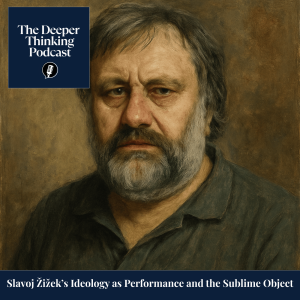
Sunday Jul 13, 2025
Slavoj Žižek's Ideology of Performance and The Sublime Object - The Deeper Thinking Podcast
Slavoj Žižek's Ideology of Performance and The Sublime Object
For anyone drawn to philosophical inquiry, subtle disobedience, and the invisible logic of modern life.
The Deeper Thinking Podcast is digially narrated
What if belief doesn’t begin in the mind, but in the gesture? In this episode, we explore ideology not as abstract conviction, but as ritual—something lived through posture, reflex, repetition. Inspired by the work of Slavoj Žižek, we trace how consent is choreographed through unconscious motion, and how freedom itself becomes a rehearsed aesthetic.
This is not a political manifesto. It is a meditation on ideology as lived structure, and how the most powerful systems don’t command us to obey—they teach us how to move. With glances toward Louis Althusser, Jacques Lacan, and G. W. F. Hegel, we examine how structure sustains itself not through belief, but through performance—until even our resistance is part of the act.
We ask what happens when the ritual stutters. When the gestures lose their rhythm. When clarity fails to arrive. The sublime object is not something you believe in—it is what belief orbits. And when it flickers, something shifts. Not into freedom, but into disorientation. A breath where language pauses. A silence that refuses to perform.
Reflections
This episode dwells at the edge of recognition. It suggests that when we stop performing fluency, what surfaces may not be truth—but residue, tension, and the echo of something unstructured.
Here are some reflections that surfaced along the way:
- Freedom doesn't arrive when we choose—it arrives when the choreography glitches.
- Ideology doesn’t need belief. It needs movement.
- You are fluent in the grammar of performance. Even refusal can follow its rhythm.
- The sublime object holds structure by staying just out of reach.
- Silence is not resistance until it breaks the script.
- We do not exit systems. We fall out of sync with them.
- Even critique, if polished, becomes maintenance.
- The structure rarely prohibits. It formats.
- Real rupture is rarely loud. It’s a pause that doesn’t resolve.
Why Listen?
- Reframe belief as embodied choreography
- Explore how ideology lives in movement, not thought
- Engage Žižek, Althusser, Lacan, and Hegel on performance, structure, and the sublime object
- Consider how critique can be a form of complicity
- Listen for what escapes—when rhythm stutters, when the object flickers
Listen On:
Support This Work
If this episode stayed with you and you’d like to support the ongoing work, you can do so here: Buy Me a Coffee (4$). Thank you.
Bibliography
- Žižek, Slavoj. The Sublime Object of Ideology. London: Verso, 1989.
- Althusser, Louis. Ideology and Ideological State Apparatuses. In: Lenin and Philosophy. New York: Monthly Review Press, 1971.
- Lacan, Jacques. The Four Fundamental Concepts of Psychoanalysis. Trans. Alan Sheridan. New York: Norton, 1978.
- Hegel, G. W. F. Phenomenology of Spirit. Trans. A. V. Miller. Oxford: Oxford University Press, 1977.
Bibliography Relevance
- Slavoj Žižek: Reframes ideology as embodied performance, not abstract belief.
- Louis Althusser: Defines how ideology interpolates individuals through practice, not persuasion.
- Jacques Lacan: Introduces the symbolic order and its role in structuring desire and subjectivity.
- G. W. F. Hegel: Provides the dialectical method and historical logic underlying ideological structure.
Sometimes what breaks the system isn’t protest—it’s the breath that doesn’t resolve. The step that refuses rhythm.
#Žižek #Althusser #Lacan #Hegel #Ideology #Philosophy #Performance #TheDeeperThinkingPodcast #Structure #Belief #SymbolicOrder #Desire #Critique #CulturalTheory
No comments yet. Be the first to say something!